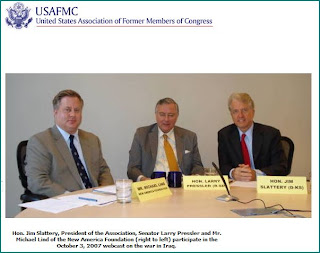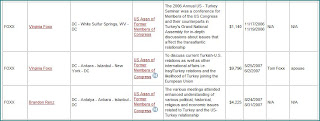
Two excerpts from The Highjacking of a Nation, Part 2: The Auctioning of Former Statesmen & Dime a Dozen Generals by Sibel Edmonds, November 29, 2006:
For years and years, information and evidence being collected by the counterintelligence operations of certain U.S. intelligence and law enforcement agencies has been prevented from being transferred to criminal and narcotics divisions, and from being shared with the Drug Enforcement Agency and others with prosecutorial power. Those with direct knowledge have been prevented from making this information available and public by various gag orders and invocation of the State Secrets Privilege. Why?
Is this due to the fact that the existence and survival of many U.S. allies; Turkey, almost all Central Asian nations, and after the September Eleven attack, Afghanistan; greatly depend on cultivating, processing, transporting, and distributing these illegal substances? Is it caused by the fact that a major source of income for those who procure U.S. weapons and technology, our military industrial complex’s bread and butter, is being generated from this illegal production and illegal dealings? Or, is it the fear of exposing our own financial institutions, lobbying firms, and certain elected and appointed officials, as beneficiaries?
When it comes to criminal and shady global networks most people envision either Mafiosi like entities who keep to themselves and are separated from society, or, street level gangster-like criminals. Contrary to these expectations, the top tier Turkish criminal networks consist mainly of respectable looking businessmen, some of whom are among the top international businessmen, diplomats, politicians, and scholarly individuals. Their U.S. counterparts are equally respected and recognizable; some of whom are high-level appointed bureaucrats within the State Department and the Pentagon; some are elected officials, and others consist of the combination of the two who have now set up their own companies and lobbying groups.
The American Turkish Council (ATC)
Operating tax-free and under the radar is one of the most powerful "non-profit" associations in the U.S., the American Turkish Council (ATC). Some who are familiar with its operations and players describe it as 'Mini AIPAC;' this description aces it. ATC followed the AIPAC model; with the direct help of AIPAC & JINSA, it created a base out of which to stretch its tentacles, reaching the highest echelons of our government. While the ATC is an association in name and in charter, the reality is that it and other affiliated associations are the U.S. government, lobbyists, foreign agents, and MIC. Investigative journalist, John Stanton, correctly describes the ATC as an extraordinary group of elite and interconnected Republicans, Democrats and corporate and military heavyweights who are spearheading one of the most ambitious strategic gambits in U.S. history.
Included in ATC's management, board of directors, and advisors; in addition to Turkish individuals of 'interest;' is a dizzying array of U.S. individuals. The ATC is led by Ret. General Brent Scowcroft, who serves as Chairman of the Board; George Perlman of Lockheed Martin, the Executive Vice President; other board members include: Former National Security Advisor Sandy Berger, Ret. General Elmer Pendleton, Ret. General Joseph Ralston, Ret. Col. Preston Hughes, Alan Colegrove of Northrop Grumman, Frank Carlucci of Carlyle Group, Christine Vick of Cohen Group, Representative Robert Wexler, Former Rep. Ed Whitfield... Basically many formers; statesmen, 'dime a dozen generals,' and representatives.


On the members - paying clients – side; their list includes all the MIC's who's who, such as Lockheed Martin, Boeing, Northrop Grumman; the Washington Lobby scene's who's who; The Cohen Group, The Livingston Group, Washington Group International...
Of course, there are also many Turkish companies that are members of the ATC. Most of these companies have branches and operations in Libya, Dubai, Azerbaijan, Uzbekistan, Tajikistan, Kyrgyzstan, and Turkmenistan. Although the official listings of their businesses are cited as 'construction,' 'real estate', 'manufacturing,' and 'tourism'; the main activities of these businesses are known to be related to global illegal arms sales and narcotic processing and trafficking. These companies provide necessary fronts and channels to launder proceeds. Curiously enough, hundreds of millions of dollars have been granted by the United States government, approved by the congress, to these Turkish companies under the guise of various 'U.S. Central Asian development programs;' and 'Iraq & Afghanistan reconstruction programs.'
Excerpts from Lawmakers still getting free trips overseas:
17 Dec 2007 // The new congressional ethics rules have curbed corporate-sponsored travel for lawmakers — but that doesn't mean they've been grounded.
Groups with foreign policy agendas are actively flying congressmen and their aides around the world, as does the high-tech industry, ideological groups and those seeking federal funds, such as universities and municipalities.
Organizations promoting Israel, China and Turkey were among the biggest trip sponsors this year.
The three nations have been mired in human rights and trade controversies under debate in Congress.
[snip]
INSIDE THE INFLUENCE
One of the biggest sponsors of trips is the U.S. Association of Former Members of Congress, which, despite its name, is not a social networking group.

Sixteen lawmakers and congressional staffers flew to Istanbul and Ankara on two different trips this year, courtesy of the USAFMC's "Congressional Study Group on Turkey," a 2005 creation whose funding includes pro-Turkey interest groups and companies that do business with the country.





The week-long trips occurred in May and August, just when Congress was debating the Armenian resolution.
The new ethics rules say that such trips cannot be planned or arranged by a lobbyist.
That doesn't mean that lobbyists cannot meet the delegations when they arrive.
While the sponsors are not allowed to explicitly tell lawmakers how to vote on a piece of legislation, there is nothing to prohibit them from making the case for their position.


The trips were entirely planned by the USAFMC, according to the group's executive director, Peter Weichlein, who responded to written questions.
"No representatives of the Turkish government have any influence over any aspect of our trips, programming and funding," he wrote.

During the August trip, the travelers stopped at the home of former U.S. Rep. Stephen Solarz, a longtime lobbyist for Turkey.
Solarz spoke to the group about the Armenian resolution and the PKK issue, Dillihay said.
"He expressed a sense of what kind of effect it could have on Turkey and U.S.-Turkish relationships," Dillihay said.
"If it was lobbying, it was soft as it could be. It was just like somebody hosting you in their house for lunch," she said.
The purpose of the meeting with Solarz was refreshments and a discussion of history, Weichlein wrote.
Cohen, who also went on a trip to Turkey, opposes the Armenian resolution, citing Turkey's strategic importance in the Middle East region and support for the U.S. in the Iraq war.
Bob Livingston, the former congressman whose firm took the lead in lobbying for Turkey on the Armenia issue, told Politico he was not involved in planning the congressional delegation's visit.
"I had absolutely nothing to do with this trip," he said.
Livingston said Solarz was working with his firm to lobby for Turkey at the time he met with the congressional delegation, and that he himself is on the USAFMC board.
In fact, even if Solarz did lobby the group, he would have been in compliance, said Jan Baran, an ethics expert at Wiley Rein.
Baran, who has done work for USAFMC on other matters, said the rules prohibit a lobbyist from traveling with a congressional delegation, not from meeting with one once it has arrived.
The ethics rules definition of "a trip" as only applying to the physical movement between locations "is fundamentally absurd," Baran said.
THE LETTER OF THE LAW
The new rules are not always quite what they seem.
One of the top sponsors of congressional trips for this year and years past is the foundation run by the American Israel Public Affairs Committee, or AIPAC, which calls itself "America's pro-Israel lobby."
The American Israel Education Foundation has funded 50 trips this year, at a cost of $633,560.
The foundation, which has no website of its own, is identified on www.aipac.org as "AIPAC's educational foundation."
The new ethics rules prohibit travel for more than a one-day trip from an organization that "retains or employs a lobbyist."
So, while AIPAC can't finance a week-long trip, its educational arm can.
Still, the group has to be careful to comply with the law. The education arm doesn't receive funding from AIPAC and the group's lobbyists are not involved with the trips, said Josh Block, an AIPAC spokesman.
The purpose of the trips is "to help members of Congress understand the issues that are at play over there," Block said.
The Israeli government in recent years has made some controversial decisions, including the expansion of settlements, the invasion of Lebanon and the bombing of a site in Syria.
Congress voted to give Israel $2.4 billion in military aid for 2008.
From Christopher Deliso's An Interview with Sibel Edmonds, Page Two, July 1, 2004:
SE: These are organizations that might have a legitimate front – say as a business, or a cultural center or something. And we've also heard a lot about Islamic charities as fronts for terrorist organizations, but the range is much broader and even, simpler.
CD: For example?
SE: You might have an organization supposed to be promoting the cultural affairs of a certain country within another country. Hypothetically, say, an Uzbek folklore society based in Germany. The stated purpose would be to hold folklore-related activities – and they might even do that – but the real activities taking place behind the scenes are criminal.
CD: Such as?
SE: Everything – from drugs to money laundering to arms sales. And yes, there are certain convergences with all these activities and international terrorism.
CD: So with these organizations we're talking about a lot of money –
SE: Huge, just massive. They don't deal with 1 million or 5 million dollars, but with hundreds of millions.
No comments:
Post a Comment